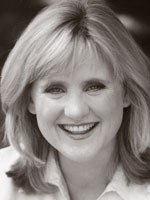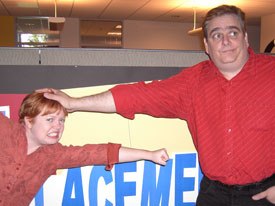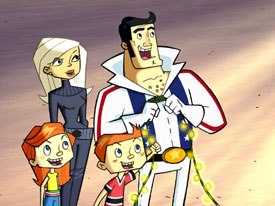For her latest column, Nancy Cartwright chats with The Replacements' Jack Thomas and asks, "Just what does an exec producer do?"

Dear Fans,
Over the next few articles, I am branching out and asking my industry friends to give me their insider takes. I am going to focus on subjects that professionals need to have some knowledge of and get opinions from a wide range of specialties and hats in the business.
These responses are from my good friend Jack Thomas, exec producer.
In previous lives, Jack Thomas, exec producer of the animated Disney series, The Replacements, has been a lawyer and a stand-up comic. "Apparently, I can't hold a job," he quips. But seriously folks, he doesn't have to worry. Since its debut in September 2006, The Replacements has been the number one rated animated TV series on the Disney Channel and ABC Kids networks.
What is an exec producer?
Nancy Cartwright: As exec producer of Disneys newest animated shows for tweens, what exactly do you do? How is an exec producer different from a producer?
Jack Thomas: As the exec producer I am the show runner. The ultimate responsibility for all creative decisions rests with me. Having said that, my background is comedy writing, so my style is to delegate a lot. Heather Martinez, my director, who is a great artist, is in charge of most art decisions. I only weigh in on what I feel are the most crucial ones and I concentrate more on writing, acting and editing.
NC: How long have you been interested in animation? You originally came to Los Angeles with the goal of becoming a lawyer. At what time did that switch for you and how did you transition into animation?
JT: Actually, I came to L.A. as a stand-up comedian. I had quit the law to do comedy. My transition to animation was pretty abrupt. I had been writing for American Movie Classics and Fox Sports when Steve Marmel suggested I freelance a script for the Fairly Oddparents. (He was the story editor.) I wrote a script in February and in June, I was a staff writer.
Working with Actors
NC: What are the actors responsibilities when cast in a show? How much input do you expect and/or want from the voice actor when casting a show?
JT: I love funny actors. And I am blessed to have such a funny cast. You, Daran [Daran Norris -- Fairly Odd Parents, Dexters Laboratory, Veronica Mars] and Grey [Grey DeLisle -- Fairly Odd Parents, Whats New Scooby-Doo?, Harvey Birdman, Attorney at Law] especially love to ad-lib. As long as I get one good take thats dead on the script Ill give my actors the freedom to ad-lib as long as it doesnt change the story. I encourage my actors to own their characters. David McCallum is always asking for one more take, and nine times out of 10 that extra take is the one I use.
NC: Please describe a casting session for a show.
JT: Casting is so high tech now. Normally I listen to a bunch of auditions that have been downloaded from Voice Bank. Then we bring in the actors for a callback. I actually try not to look at the actors, some of them are so funny with their expressions and gestures, but none of that translates, obviously. So I just stare at a picture of the character they are reading for.

How to Become an Animation Writer
NC: The animation industry has the reputation of being a very tight-knit group, from writers to animators to voices. What does it take to be successful in this part of the business?
JT: Well, that really varies depending on what job you are doing in the business, but if there is one common element you need to possess I would say thats versatility. You need to be able to tailor your art, your writing, your voice work, to a variety of different styles, because no show lasts forever.
NC: So, if I am interested in being a writer for animation, what steps would I take?
JT: Watch a lot of cartoons. Learn to think and write visually. These arent sitcoms. That also means write animation specs, not sitcom specs.
How to Become an Animator
NC: If I were interested in being an animator for an animated show, what steps would I take?
JT: Prepare yourself for a life of pain. (My director told me to say that.) Draw. Draw. Draw. And draw lots of different thing and styles. Push yourself outside your comfort zone so that your portfolio has a lot of variety.
NC: What are my chances of a successful career in animation if I dont live in New York or Los Angeles?
JT: I really dont know that you have much chance at all unless you just go out and produce your own shows on the Net. If you do, maybe someone will find you.

The Impact of New Media
NC: With the animation industry evolving so quickly and with the introduction of the Internet, podcasting and satellite radio, how have these advances affected your job? What do these changes mean for voice actors?
JT: The Internet really hasnt affected the way I do my job, but I think our development executives are always using it to be on the look out for new ideas and creators. I dont know of any specific voice actor having been discovered on the Net, but I am sure its just a matter of time. The great thing about the Internet from a creative standpoint is that you can totally control your own content if you are willing to foot the bill. That bad news is your content has a high probability to never be seen.
The Path to Voice Acting
NC: if I were interested in doing voices for animation, what steps would I take?
JT: Beyond developing your talent, you have to have an agent. That is absolutely essential. Several voice actors I know started by studying under other experienced actors. So dont hesitate to take classes.
NC: I get many requests from parents who are interested in getting their children involved with animation. What kinds of opportunities are out there for kids?
JT: Not too many, really. Most voice acting is done by adults. But there is nothing stopping kids from using their computers and the Internet to create their own content and throwing it up on YouTube. You never know
NC: It used to be that voice-overs merely supplemented an artists desire to act on camera. Nowadays, you cant watch an animated show/film without seeing the name of a celebrity. What are your thoughts about this trend? Should there be a separate category for non-celebrity talent?
JT: I think voice actors have always been underappreciated in this business. Why SAG doesnt have awards for them is beyond me. Even the Annies gives out a paltry number of awards to voice actors. What is it? Two? Thats a joke. As for celebs voice acting, some of them can do great voice work and I have no problem with them getting recognized for that work. But a lot of very excellent on-screen actors have a tough time adjusting, because they cant do enough with just their voice. Theyre used to having their face and their body to help sell their performances.
NC: And finally, what advice would you give someone interested in doing voice overs? What do you recommend?
JT: Take some classes. Build a demo reel. Get an agent. Did I mention, Prepare for a life of pain?
Nancy Cartwright is best known as the voice of spiky-headed Bart Simpson on The Simpsons. She has voiced dozens of cartoon characters in her career that has spanned more than 20 years. Currently, she can be heard as the voice of Rufus the Naked Mole Rat on Disney's Kim Possible and Chuckie on Rugrats and All Grown Up. To learn more about Nancy's career, listen to her audio book My Life as a 10-Year-Old Boy.







